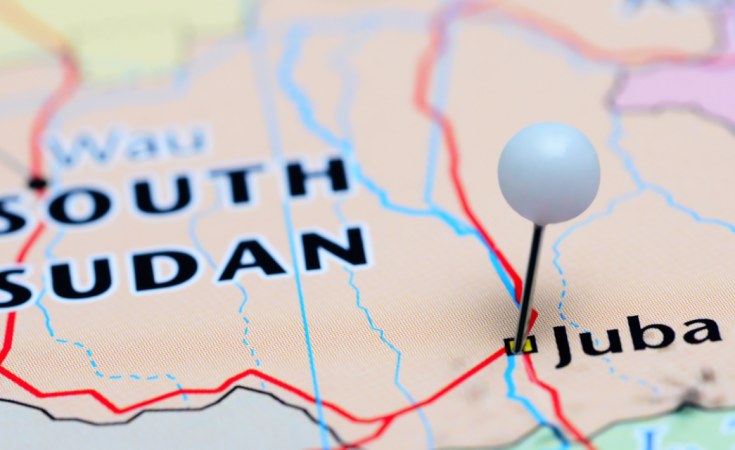Augustine Swaka, a 44-year-old mechanic is one of the oldest residents of Munuki, a suburb of Juba that is inhabited by both the city's emerging middle class and poor alike. At about 10 am, his nine-year-old son, Davido, walked quietly and hid behind a white ram-shackled land cruiser pick-up, before starting a loud irritating cry that alerted everyone in their home cum motor repair garage compound.
"Davido. Davido...," the father shouts. He responded by reducing the volume of his cry. "Why are you crying?" the father inquires. "Look at what Mama has given me for breakfast today. I want a sandwich. I don't want this. It's not nice," he attempts to pass the local pancakes the mother gave him to the father. "But ... "Foul Masri" (a type of beans commonly enjoyed with baked bread) is now very expensive," the mother tries to explain. She told the husband that the price of Foul Masri has now increased nearly fourfold since last year and walks towards her son, Davido, perhaps to console him.
But it is not only Davido who is crying, South Sudanese from all walks of life are feeling the high cost of living in the country. The government yesterday in a press conference blamed its economic burden on the conflict in Sudan, and the ongoing blockade of the Red Sea route by Yemen's Houthi rebels.
Oil flow failures
Insecurity in neighbouring Sudan and the flooding of the oil wells has made it challenging for South Sudan to pump much-needed crude oil to reach export markets, Central Bank Governor Dr James Alic Garang said in a press conference earlier this month. According to the trade research publication, S&P Global Insights, oil exports out of Sudan's Bashayer port terminal hit an 11-month low of 79,000 barrels per day last month.
South Sudan relies on Sudan's pipelines and refineries, as well as ports on the Red Sea, to export its 150,000 barrels of oil per day, Bloomberg reported. With 90% of South Sudan's government operating budget relying on oil, the oil ministry's undersecretary, Mayen Wol Jong, said late last year that he is worried the conflict will curtail production.
The Dar Oil Company, one of the main oil producers in South Sudan, failed to load South Sudan's crude oil in February due to a rupture in an oil pipeline in Khartoum, according to news reports. At least one cargo load of 600,000 barrels of oil due to be loaded on 22 and 23 February was cancelled.
The repeated oil flow shutdowns are causing a "gelling process" whereby the stagnant crude oil turns into a gel-like composition, explained South Sudan's Information Minister Michael Makuei in a press conference late last month. "Now the pipelines taking our crude to Port Sudan have experienced the gelling process ... making it difficult for the crude oil to reach export markets," Makuei said in a state television interview. "Even if the crude were to reach port Sudan, it would not be possible to ship it for sale due to the threat of blocking shipping in the Red Sea," he added, referring to the Houthi rebels from Yemen who have targeted ships in the Red Sea since the start of the conflict in Gaza.
Augustino Ting Mayai, Head of Research at the Juba-based think-tank Sudd Institute, and the Chair of South Sudan's Bureau of Statistics had warned of the impact of any form of blockade on South Sudan's oil exports. "A complete blockade would be problematic," Mayai told Ayin. "We would likely see a repeat of 2012 when South Sudan shut its oil production leading to an overall non-salary spending cut of approximately 50%, an increase in the collection of non-oil revenue through taxation, food insecurity, and a lack of available hard currency that led to the freeze of most government projects," he said.
Inflation
The curb in oil production and restricted trade with South Sudan's northern neighbour has led to a spike in prices. In the capital Juba, prices of basic commodities and public services such as transport have increased unexpectedly in the past few weeks, residents said, as the South Sudanese Pound (SSP) has lost value vis-à-vis the dollar, falling from 1,260 SSP for a dollar to 1,550 SSP.
A litre of petrol is going for 1,700 SSP from 1,350 SSP in most petrol stations, a change public transport operators passed to the passengers, the same sources said. Passengers appeared bewildered as they discovered they must pay an additional 200 SSP to make the trip from Gudele to Juba Town after jumping on the 14-seater minibuses. "At this rate, I am going to have to walk in the mornings despite the distance and heat," said resident Stephen Lokang.
There was more drama outside Juba Teaching Hospital as a woman in her early forties is seen asking for mercy from a local juice vendor who increased the cost of a full big glass to 1,200 SSP from 800SSP, an increase that is unknown to the heat-exhausted middle-aged woman.
Dr. Alic assured the Bank's commitment to fix the current exchange rates saying the Bank is strengthening its monetary policy framework and mobilizing foreign exchange to stabilize the market.
According to Dr Alic, the bank will also "adhere to broad money targets while monitoring and anchoring inflation expectations, continue to maintain a fair and an orderly market environment." In an acknowledgement of the criticisms and the challenges that lie ahead, Dr Alic calls for the support of all stakeholders and development partners in fostering a resilient and competitive foreign exchange market for sustainable economic development.


